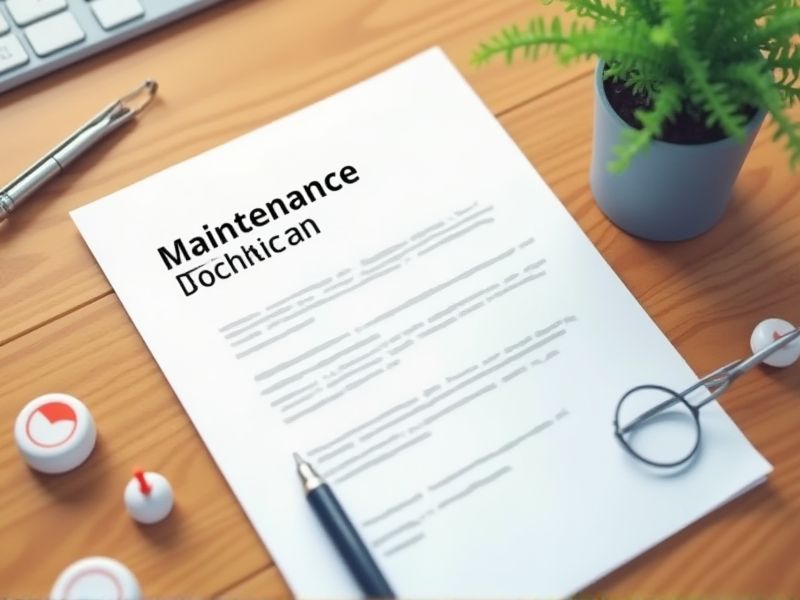
Maintenance Technicians in the energy systems field ensure the optimal performance and safety of power generation and distribution systems. Certifications validate a technician's proficiency and understanding of complex systems, which minimize operational risks and enhance system efficiencies. Energy systems often involve hazardous elements, so certifications signify a technician's capability to adhere to regulatory standards and safety protocols. Below are key certifications that might be necessary for a Maintenance Technician working in Energy Systems.
Certified Energy Manager (CEM)
Improving energy system efficiency often relies on informed decision-making, which a Certified Energy Manager (CEM) ensures by bringing expert knowledge to the table. Maintenance technicians benefit from CEM guidance, as it can lead to substantial energy cost savings and increased system reliability. The CEM's ability to analyze and optimize energy usage translates directly into effective maintenance strategies. Knowledge of the latest energy technologies and best practices that CEMs possess can significantly enhance a maintenance technician's role in energy systems management.
Certified Maintenance & Reliability Technician (CMRT)
The demand for a Certified Maintenance & Reliability Technician (CMRT) arises due to the increasing complexity of energy systems, which requires specialized knowledge to ensure optimal performance. CMRT certification equips maintenance technicians with standardized skills and techniques essential for maximizing equipment reliability and minimizing downtime. The energy industry faces regulatory and environmental pressures that necessitate efficient and sustainable operations, which CMRT-certified professionals are trained to uphold. Investing in CMRT certification leads to improved safety protocols and cost-effective maintenance practices within energy sectors.
OSHA 10/30 Certification
OSHA 10/30 certification ensures maintenance technicians understand essential safety practices, reducing risks in energy systems work environments. This certification educates technicians on hazard recognition, which decreases workplace accidents and enhances safety protocols. Compliance with OSHA regulations can result in fewer liabilities for companies, promoting a safer work culture. It builds technicians' credibility and competence, leading to improved job opportunities and career advancement.
EPA 608 Certification
The EPA 608 Certification is crucial for a Maintenance Technician working with energy systems because it ensures compliance with federal regulations when handling refrigerants. This certification helps prevent environmental harm by ensuring technicians safely manage substances that can deplete the ozone layer. Certified technicians are better equipped to perform efficient repairs, leading to enhanced system performance and energy conservation. Having this certification often means access to more job opportunities and is a standard industry requirement for those in HVAC and similar fields.
NICET Certification in Electrical Systems
NICET Certification in Electrical Systems is required because it ensures that a Maintenance Technician possesses the necessary knowledge and skills for handling complex electrical systems in energy applications. This certification validates a technician's capability to maintain safety standards, which is crucial in preventing malfunctions or accidents. It also enhances credibility and trust with employers and clients, reflecting a professional's commitment to industry standards. Due to evolving technological advancements, certified technicians are more likely to stay informed about the latest energy system maintenance practices.
HVAC/R Technician Certification
Possessing HVAC/R Technician Certification ensures a maintenance technician has the necessary knowledge to efficiently handle complex energy systems. Certification verifies that the technician can safely work with refrigerants and follow industry-standard procedures, reducing system failures. It equips technicians with the skills to optimize system performance, ultimately lowering energy consumption and operational costs. Companies often require certification to meet compliance standards and ensure technicians can handle advanced HVAC/R technologies effectively.
PLC & Controls Certification
Possessing a PLC & Controls Certification enables maintenance technicians to efficiently diagnose and repair complex issues within energy systems, reducing downtime and ensuring reliability. This certification provides specialized knowledge in programmable logic controllers, enhancing a technician's ability to automate and optimize energy processes. With energy systems becoming increasingly reliant on sophisticated controls, certified technicians are better equipped to handle emerging technologies. Companies benefit from employing certified technicians as it leads to improved system performance and compliance with industry standards.
Vibration Analysis Certification
Vibration Analysis Certification equips maintenance technicians with the skills necessary to identify and diagnose equipment issues before they result in costly failures. By understanding the vibration patterns of energy systems, technicians can perform predictive maintenance, reducing downtime and increasing system reliability. Certified technicians can better interpret data, ensuring more precise maintenance actions that enhance the longevity of critical components. As energy systems become increasingly complex, having certified individuals ensures the effective management of mechanical assets, aligning with industry standards and best practices.
Industrial Machinery Maintenance Certification
Industrial machinery maintenance certification ensures that technicians have the necessary skills and knowledge to efficiently maintain energy systems. This certification reduces the risk of equipment failure, leading to increased operational reliability and cost savings. Certified technicians are more adept at identifying potential issues early, preventing costly downtime. Employers can be confident in the expertise of certified personnel, improving safety standards within energy systems operations.
Root Cause Analysis (RCA) Certification
Obtaining a Root Cause Analysis (RCA) Certification equips maintenance technicians with the skills necessary to identify and resolve recurring issues in energy systems, thus improving system reliability and efficiency. Trained technicians can pinpoint the fundamental causes of failures, which reduces downtime and operational costs. RCA-certified technicians contribute to extending the lifespan of energy equipment by addressing issues before they escalate into major problems. The knowledge gained through RCA certification helps facilitate data-driven decisions that enhance overall system performance.
Summary
By obtaining certifications, you enhance your credibility as a Maintenance Technician for Energy Systems, increasing job opportunities. Certified technicians typically command higher salaries due to recognized expertise. Employers often notice increased efficiency and safety in systems managed by certified professionals. This, in turn, leads to improved energy system performance and reduced operational costs for companies.
